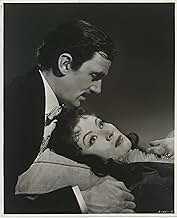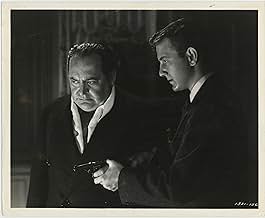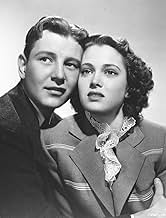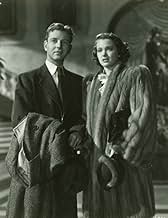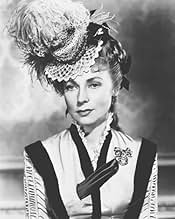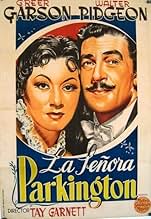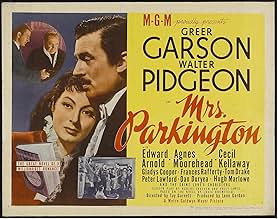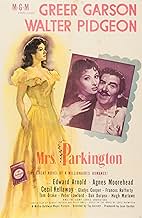IMDb-BEWERTUNG
7,0/10
1973
IHRE BEWERTUNG
Eine verwitwete Matriarchin erinnert sich an ihr Familienvermögen, einschließlich ihrer Romanze mit einem Finanzier/MinenbesitzerEine verwitwete Matriarchin erinnert sich an ihr Familienvermögen, einschließlich ihrer Romanze mit einem Finanzier/MinenbesitzerEine verwitwete Matriarchin erinnert sich an ihr Familienvermögen, einschließlich ihrer Romanze mit einem Finanzier/Minenbesitzer
- Für 2 Oscars nominiert
- 4 Gewinne & 3 Nominierungen insgesamt
St. Luke's Episcopal Church Choristers
- Carolers
- (as Saint Luke's Choristers)
Empfohlene Bewertungen
Greer Garson and Walter Pidgeon turn in fine performances here, in fact, they're as good here as in any of their films. Garson has long been a favorite of mine, and I particularly revere her performance in "Random Harvest". This film isn't quite that good, but it is a gem.
Of particular interest here are two very unusual performances by supporting actors. When I read, in advance, that Agnes Moorehead played a French socialite...well, I just couldn't see it. But, she was wonderful, and this is an Agnes Moorehead you've never seen before! And Cecil Kellaway as Edward, Prince of Wales...again, a very different performance, and so well done.
The story itself is interesting, with Garson as an old family institution reflecting on her life. If there's a criticism about this film, it's that Garson looks too young even in her elderly makeup. But, for much of the movie, she's her usual alluring self. Is it a sentimental melodrama? Yes. But a delightful one.
Of particular interest here are two very unusual performances by supporting actors. When I read, in advance, that Agnes Moorehead played a French socialite...well, I just couldn't see it. But, she was wonderful, and this is an Agnes Moorehead you've never seen before! And Cecil Kellaway as Edward, Prince of Wales...again, a very different performance, and so well done.
The story itself is interesting, with Garson as an old family institution reflecting on her life. If there's a criticism about this film, it's that Garson looks too young even in her elderly makeup. But, for much of the movie, she's her usual alluring self. Is it a sentimental melodrama? Yes. But a delightful one.
Greer Garson got an Oscar nomination for one of her best roles in Mrs. Parkington. Though the film is one that had her co-starring with her favorite leading man, the film is all Greer.
Like Maytime the film starts with Greer as the aged family matriarch of the Parkington family during Christmas of 1938. Her husband who died many years ago was Walter Pidgeon and the family has gathered once again. But there's a crisis brewing. Her grandson-in-law Edward Arnold has embezzled a ton of money in some bad market speculation. His daughter Frances Rafferty and Garson's great granddaughter additionally has a romantic problem, she's torn between her fiancé Tom Drake who is whistleblowing on Arnold and family loyalty.
During the evening Garson reminisces back to certain crisis times in her own marriage and it eventually tells her what she must do in this situation. I will say this about the Parkingtons, Garson's the genuine article, the rest of them are a spoiled and selfish lot, only Rafferty seems to have escaped the taint.
I have to say it was a little strange seeing the much older Gladys Cooper playing the daughter of the heavily made up Greer Garson, still both actresses are professional enough to make it convincing. There's a wonderful performance by Cecil Kellaway as the Prince of Wales during the Gay Nineties when Parkingtons are in Europe. Kellaway may be the Prince of Wales, but he proves to be real sharp in terms of human relations and delicately removes a bump in the road of the Parkington marriage.
Agnes Moorehead got a Supporting Actress nomination for Mrs. Parkington in the role of an impoverished French aristocrat who becomes friend and confidante of Garson. She gives Garson a lot of sage advice. She lost to Ethel Barrymore for None But The Lonely Heart and Garson lost her race for Best Actress to Ingrid Bergman in Gaslight.
Mrs. Parkington remains however one of MGM's best films of the Forties. The influence of Maytime and of Citizen Kane in the telling of the Parkington family story is obviously apparent. And the message about both inherited wealth and the damage that mere speculation without creating could have come from Wall Street. For Greer Garson and Walter Pidgeon fans a must.
Like Maytime the film starts with Greer as the aged family matriarch of the Parkington family during Christmas of 1938. Her husband who died many years ago was Walter Pidgeon and the family has gathered once again. But there's a crisis brewing. Her grandson-in-law Edward Arnold has embezzled a ton of money in some bad market speculation. His daughter Frances Rafferty and Garson's great granddaughter additionally has a romantic problem, she's torn between her fiancé Tom Drake who is whistleblowing on Arnold and family loyalty.
During the evening Garson reminisces back to certain crisis times in her own marriage and it eventually tells her what she must do in this situation. I will say this about the Parkingtons, Garson's the genuine article, the rest of them are a spoiled and selfish lot, only Rafferty seems to have escaped the taint.
I have to say it was a little strange seeing the much older Gladys Cooper playing the daughter of the heavily made up Greer Garson, still both actresses are professional enough to make it convincing. There's a wonderful performance by Cecil Kellaway as the Prince of Wales during the Gay Nineties when Parkingtons are in Europe. Kellaway may be the Prince of Wales, but he proves to be real sharp in terms of human relations and delicately removes a bump in the road of the Parkington marriage.
Agnes Moorehead got a Supporting Actress nomination for Mrs. Parkington in the role of an impoverished French aristocrat who becomes friend and confidante of Garson. She gives Garson a lot of sage advice. She lost to Ethel Barrymore for None But The Lonely Heart and Garson lost her race for Best Actress to Ingrid Bergman in Gaslight.
Mrs. Parkington remains however one of MGM's best films of the Forties. The influence of Maytime and of Citizen Kane in the telling of the Parkington family story is obviously apparent. And the message about both inherited wealth and the damage that mere speculation without creating could have come from Wall Street. For Greer Garson and Walter Pidgeon fans a must.
Greer Garson lived to be 91 years old, and she never looked as she did as the older Mrs. Parkington and the older Madame Curie - all white.
In this 1944 film, the Parkington family meets for Christmas, just before they all learn of a scandal which will impact the family fortune and the reputation of the family.
Thinking about her husband, Susie (Greer Garson), the matriarch, now 84, thinks back to meeting her husband Gus (Walter Pidgeon) at her family boarding house in Leaping Frog, Nevada. The major, as he was called, owned the mine where everyone worked.
Susie had always dreamed of being in high society, and she knew all about it and would fantasize about what it would be like. She gets her wish when, after the loss of her mother when the mine caves in, the Major and Susie marry and go to New York.
There she meets Aspasia (Agnes Moorhead), the Major's former mistress, who takes Susie in hand and helps her to buy clothes and learn the ways of society. Susie and the Major have children and encounter tragedy and separation. With the Major gone now, Susie reflects on how best to handle this situation by asking herself what the Major would do.
Really lovely film, with fine performances by Moorhead, Pidgeon, and of course, Garson. In the beginning she sports a black wig; I kind of missed, even in black and white, her flaming red hair. Strangely, Gladys Cooper plays Garson's daughter when Mrs. Parkington was 84. Cooper was 16 years older in reality.
In those days, it was more economical for studios to use actresses under contract than borrow someone (though lending actors out was incredibly lucrative). Possibly Cooper was under contract and available.
The film also features Edward Arnold, Dan Duryea, Lee Patrick, Tom Drake, Hugh Marlowe, Hans Conried, with Peter Lawford in a tiny role.
Good movie.
In this 1944 film, the Parkington family meets for Christmas, just before they all learn of a scandal which will impact the family fortune and the reputation of the family.
Thinking about her husband, Susie (Greer Garson), the matriarch, now 84, thinks back to meeting her husband Gus (Walter Pidgeon) at her family boarding house in Leaping Frog, Nevada. The major, as he was called, owned the mine where everyone worked.
Susie had always dreamed of being in high society, and she knew all about it and would fantasize about what it would be like. She gets her wish when, after the loss of her mother when the mine caves in, the Major and Susie marry and go to New York.
There she meets Aspasia (Agnes Moorhead), the Major's former mistress, who takes Susie in hand and helps her to buy clothes and learn the ways of society. Susie and the Major have children and encounter tragedy and separation. With the Major gone now, Susie reflects on how best to handle this situation by asking herself what the Major would do.
Really lovely film, with fine performances by Moorhead, Pidgeon, and of course, Garson. In the beginning she sports a black wig; I kind of missed, even in black and white, her flaming red hair. Strangely, Gladys Cooper plays Garson's daughter when Mrs. Parkington was 84. Cooper was 16 years older in reality.
In those days, it was more economical for studios to use actresses under contract than borrow someone (though lending actors out was incredibly lucrative). Possibly Cooper was under contract and available.
The film also features Edward Arnold, Dan Duryea, Lee Patrick, Tom Drake, Hugh Marlowe, Hans Conried, with Peter Lawford in a tiny role.
Good movie.
It's Christmastime in 1938. Elegant 83-year-old family matriarch Greer Garson (as "Susie" Graham-Parkington) welcomes various family members to her majestic New York mansion. The guests display various excesses, which are fueled by their wealth. We will learn the family fortune, estimated at over $30 million (not too shabby for 1938), could be in jeopardy. The holiday spirit triggers Ms. Garson's life story to be told, in a series of extensive flashbacks
Long ago, 18-year-old Garson tends to guests in her poor mother's boarding house. Their Leaping Rock, Nevada home is visited by silver mining tycoon Walter Pidgeon (as Augustus "Gus" Parkington). Garson and Mr. Pidgeon exchange winks; we're off and running...
We see newlywed Garson move from lowly to life in high society. She doesn't have far to go, looking impeccable in her scenes as a Leaping Rock chambermaid. Still, attractive Agnes Moorehead (as Aspasia Conti) decides to show Garson the ropes, having given up on playboy Pidgeon. Multi-millionaires have problems too, as we discover while the decades pass...
"Mrs. Parkington" isn't a very engaging story, but it is an excellent star vehicle for Greer Garson. It's all tailor-made, right down to the way she blows the curl dangling over her forehead. The actress had become MGM's most bankable female, with huge box-office success and measured critical acclaim. Very popular with "Oscar" voters, Garson added another nomination to her collection. She does an outstanding job, though her craftiness and make-up are not often subtle. Moorehead, Edward Arnold and the supporting cast all hit their marks. Director Tay Garnett, photographer Joseph Ruttenberg and the MGM crew make everything look superlative. A sense of staginess pervades, but it's appropriate; after all, this isn't "Citizen Kane".
****** Mrs. Parkington (1944-10-12) Tay Garnett ~ Greer Garson, Walter Pidgeon, Agnes Moorehead, Edward Arnold
We see newlywed Garson move from lowly to life in high society. She doesn't have far to go, looking impeccable in her scenes as a Leaping Rock chambermaid. Still, attractive Agnes Moorehead (as Aspasia Conti) decides to show Garson the ropes, having given up on playboy Pidgeon. Multi-millionaires have problems too, as we discover while the decades pass...
"Mrs. Parkington" isn't a very engaging story, but it is an excellent star vehicle for Greer Garson. It's all tailor-made, right down to the way she blows the curl dangling over her forehead. The actress had become MGM's most bankable female, with huge box-office success and measured critical acclaim. Very popular with "Oscar" voters, Garson added another nomination to her collection. She does an outstanding job, though her craftiness and make-up are not often subtle. Moorehead, Edward Arnold and the supporting cast all hit their marks. Director Tay Garnett, photographer Joseph Ruttenberg and the MGM crew make everything look superlative. A sense of staginess pervades, but it's appropriate; after all, this isn't "Citizen Kane".
****** Mrs. Parkington (1944-10-12) Tay Garnett ~ Greer Garson, Walter Pidgeon, Agnes Moorehead, Edward Arnold
"Mrs. Parkington" is an incredibly well made film--with great acting and some lovely production values. Clearly, MGM gave this film the full glossy studio treatment. And, for her wonderful performance, Greer Garson was nominated for an Oscar. However, I am very ambivalent about the film because so many of the characters are either despicable or pathetic. In many ways, it reminds me of the country music song "Stand By Your Man"--as a woman should put up with ANYTHING in order to keep even the most awful man. Clearly, this is a film for dependent personalities!
The film begins near the present time. The Parkington family appears to be made up of a group of sociopaths--all loathsome jerks who think mostly of themselves. When the matriarch, Mrs. Parkington (Garson) learns that one of the brood is a thief, she begins to reminisce--remembering her life with Mr. Parkington (Walter Pidgeon). At first, their marriage seems pretty nice--with a rich and doting husband. However, through the course of these long series of flashbacks, you learn that Mr. Parkington is vindictive, petty, selfish and cheats on Mrs. Parkington. And, as for Mrs. Parkington, she is clever and long-suffering--and lifted up as some sort of shining example. I couldn't help but think she was pathetic and would have probably accepted Mr. Parkington back after he murdered or slept with children or sheep. And this brings me to my ambivalence--no one--not anyone in this family is likable in the least. And, the film seems to promote the notion that a woman's job is just to put up with this and smile throughout! Talk about an anti-feminist message! The bottom line is that I'd hate for my daughters to watch such a film, as I'd hate to think that Mrs. Parkington is someone to admire (though the film tries HARD to say this). If Garson's character had either shot her husband or left him and bled him dry in alimony, then maybe I would have enjoyed it much more. A great job of acting and a sick message to this film.
Oh, and I should mention that in one brief scene, the Parkingtons joke about how it is Mr. Parkington's job to regularly 'thrash his wife'. Wow....need I say any more?! Well, yes. If you like films that promote women as lovely doormats, also try Mary Pickford's last film, "Secrets". Her husband is also a piece of work and she looks back fondly to their lives together.
The film begins near the present time. The Parkington family appears to be made up of a group of sociopaths--all loathsome jerks who think mostly of themselves. When the matriarch, Mrs. Parkington (Garson) learns that one of the brood is a thief, she begins to reminisce--remembering her life with Mr. Parkington (Walter Pidgeon). At first, their marriage seems pretty nice--with a rich and doting husband. However, through the course of these long series of flashbacks, you learn that Mr. Parkington is vindictive, petty, selfish and cheats on Mrs. Parkington. And, as for Mrs. Parkington, she is clever and long-suffering--and lifted up as some sort of shining example. I couldn't help but think she was pathetic and would have probably accepted Mr. Parkington back after he murdered or slept with children or sheep. And this brings me to my ambivalence--no one--not anyone in this family is likable in the least. And, the film seems to promote the notion that a woman's job is just to put up with this and smile throughout! Talk about an anti-feminist message! The bottom line is that I'd hate for my daughters to watch such a film, as I'd hate to think that Mrs. Parkington is someone to admire (though the film tries HARD to say this). If Garson's character had either shot her husband or left him and bled him dry in alimony, then maybe I would have enjoyed it much more. A great job of acting and a sick message to this film.
Oh, and I should mention that in one brief scene, the Parkingtons joke about how it is Mr. Parkington's job to regularly 'thrash his wife'. Wow....need I say any more?! Well, yes. If you like films that promote women as lovely doormats, also try Mary Pickford's last film, "Secrets". Her husband is also a piece of work and she looks back fondly to their lives together.
Wusstest du schon
- WissenswertesUnusual for a film even today, the movie was shot in chronological order.
- PatzerThe gypsy fiddler plays Johann Strauss's "Roses from the South" on violin in a scene set in 1872, but that music was written in 1880.
- Zitate
Susie 'Sparrow' Parkington: Why did you marry me?
Major Augustus Parkington: Life was too simple without you.
- Alternative VersionenIn the European released version, Cecil Kellaway was replaced by 'Hugo Haas' and the role was changed to "Balkan King." Also, Tala Birell's character was changed to simply "Countess" instead of "Lady Norah Ebbsworth." Three actors in casting call lists but who were not in the U.S. print (Ann Codee, George Davis and Frank Reicher may also have been in this version (see the trivia section.)
- VerbindungenFeatured in Twenty Years After (1944)
- SoundtracksI'll Take You Home Again, Kathleen
(1876) (uncredited)
Music by Thomas Payne Westendorf
Played extensively in the score, mostly as a love theme
Top-Auswahl
Melde dich zum Bewerten an und greife auf die Watchlist für personalisierte Empfehlungen zu.
Everything New on HBO Max in August
Everything New on HBO Max in August
Looking for something different to add to your Watchlist? Take a peek at what movies and TV shows are coming to HBO Max this month.
- How long is Mrs. Parkington?Powered by Alexa
Details
- Erscheinungsdatum
- Herkunftsland
- Sprache
- Auch bekannt als
- La señora Parkington
- Drehorte
- Morrison Ranch, Agoura, Kalifornien, USA(fox hunt sequence)
- Produktionsfirma
- Weitere beteiligte Unternehmen bei IMDbPro anzeigen
- Laufzeit
- 2 Std. 4 Min.(124 min)
- Farbe
- Seitenverhältnis
- 1.37 : 1
Zu dieser Seite beitragen
Bearbeitung vorschlagen oder fehlenden Inhalt hinzufügen


